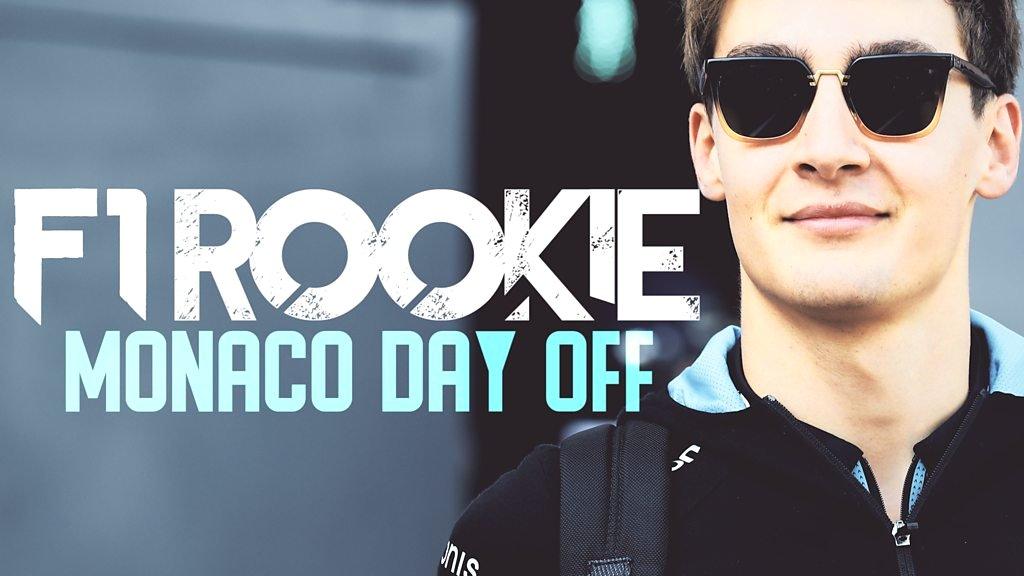Canadian GP: Sebastian Vettel's massive if understandable sulk
- Published
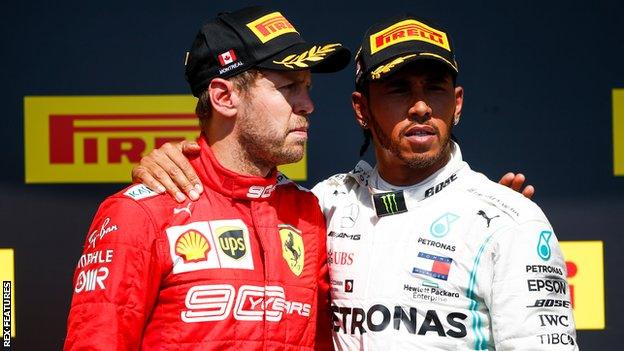
If Formula 1 needed a drama to liven up a season that has so far been dominated by Mercedes, it certainly got it at the Canadian Grand Prix.
Lewis Hamilton took his fifth victory in seven races this year, and Mercedes' winning streak continued - but only after Ferrari's Sebastian Vettel, who won on the road, was handed a five-second penalty for dangerous driving.
The man on the receiving end of the behaviour for which Vettel was punished was Hamilton, and so the Briton's 78th career victory, which puts him even firmer on course for a sixth world title than he already was, turned into one of his most controversial.
Was the penalty right? Was Vettel "robbed", as he claimed? Was the penalty even the biggest issue to arise out of the incident in which Vettel ran wide at Turn Three, skipped over the grass and impeded Hamilton as he rejoined? These questions will reverberate in Formula 1 for some time to come, regardless of the outcome of the appeal Ferrari lodged on Sunday evening.
The incident
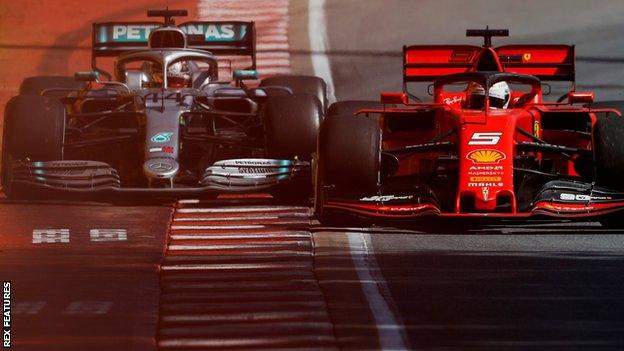
"It's not making our sport popular with these kind of decisions," Vettel said of the five-second penalty handed to him
The moment that stoked a social media storm, and provoked a massive if understandable sulk from Vettel after the race - in which he initially refused to go on to the podium before being collected by officials, and then, while on it, walked away from an interview mid-question - happened on lap 48.
Vettel had led the race from the start, after taking a superb pole position on Saturday, his first for 17 races.
But Hamilton had never been far away, and after the pit stops the Mercedes began to close in, reducing what had been a five-second lead for Vettel to less than a second in 10 laps.
For another nine laps, Hamilton piled on the pressure, always within a second of the Ferrari. And then Vettel made a mistake.
He went in to the Turn Three/Four chicane too fast, had a snap of oversteer, took to the grass and rejoined the track. As he did so, he had another snap, caught it, and continued to drift wide out to the kerb. Hamilton, whose front wheel was in front of Vettel's rear, had to back out of it and Vettel retained the lead.
The stewards investigated the incident and decided to penalise Vettel, saying they "reviewed video evidence and determined that (Vettel) left the track at Turn Three, rejoined the track at Turn Four in an unsafe manner and forced (Hamilton) off track. (Hamilton) had to take evasive action to avoid a collision."
What does a young F1 driver get up to on his day off in Monaco?
The rules
A number of F1 regulations apply to this sort of incident. One says: "Should a car leave the track the driver may re-join, this may only be done when it is safe to do so and without gaining any lasting advantage."
The question here being, did Vettel gain a lasting advantage by doing what he did?
Another says: "Manoeuvres liable to hinder other drivers, such as deliberate crowding of a car beyond the edge of the track or any other abnormal change of direction, are strictly prohibited."
And another: "It is not permitted to drive any car unnecessarily slowly, erratically or in a manner deemed potentially dangerous to other drivers at any time."
What was Vettel's view?
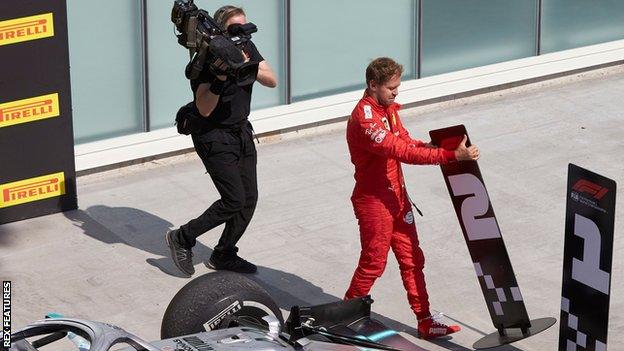
Vettel is still searching for his first win since the Belgium Grand Prix in 2018
Vettel was furious with the decision, which cost him what would have been a first win since Belgium last August - and would have been a form of redemption after what has undoubtedly been for the German a very trying period since.
He raged about it on the radio during the race: "You need to be an absolute blind man to think you can go through the grass and then control the car. I was lucky I didn't hit the wall. Where the hell am I supposed to go? This is a wrong world I tell you. This is not fair."
Told to calm down by team boss Mattia Binotto, he said: "I am not staying calm. This is not fair. It is not fair. I'm angry, and I have the right to be angry. I don't care what people say."
At the end of the race, he stopped his car at the near end of the pit lane, as far as he could be from where he was meant to stop it in what is known as parc fermé, and stormed back to the Ferrari tent, clearly not intending to go to the podium.
Fetched by his media adviser and an F1 official, he went to where he should have stopped, and removed the "number one" board from in front of Hamilton's Mercedes and placed it in front of the empty space where his car should have been.
Once in the green room before the podium ceremony, he shook Hamilton's hand and said: "Where am I supposed to go?"
"Achh," Hamilton said, deciding it was not the right moment to express his own opinion.
In his media interviews, Vettel added: "I was trying to survive, to keep the car on track. I came from the grass, the tyres were dirty and I was fighting to get back on line and get control back of the car.
"I don't know what I can do differently. It is a very short time. I lost the rear on entry. I had to make the correction. I sailed through the grass. I was lucky not to spin.
"Once I regained control, I had a look in the mirror and Lewis was right behind me. I was lucky he did not try to go on the inside and just drive past me. I don't know where he was. Maybe he was too far away. But the gap I had was gone."
Hamilton's opinion
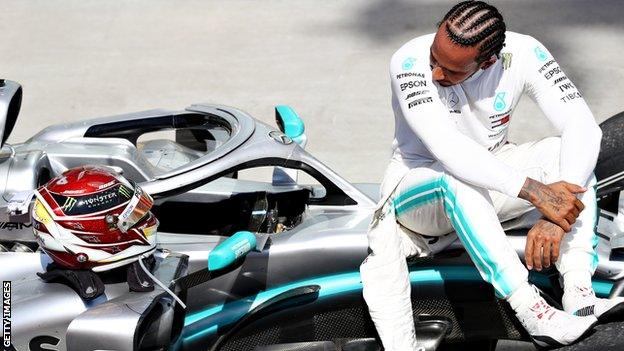
Thanks to Hamilton's seventh Canadian win the Mercedes man now has a 29-point advantage in the title race
Hamilton said: "The Ferraris were really quick. I just had to put him under pressure and force a mistake because they were so quick on the back straight that even if I got close into Turn 10 he would just pull away. And he made a mistake.
"Ultimately the rules say when you go off you have to come back on in a safe manner and I was alongside and I had to back off to avoid a collision and I guess that's why they made the decision."
Asked whether he would have preferred to race on without Vettel receiving a penalty, Hamilton said: "If you try to force a guy into a wall, are you saying you shouldn't get a penalty for that? I was going to crash with him, so I had to brake.
"I was just driving the normal line so I shouldn't have been in that position of being close to crashing. It was his responsibility to avoid that, but it ended up being mine. So because of that I lost a chance of passing.
"I won. Of course I want to do it on the track. Even after I knew he had a penalty, I was pushing and thinking maybe I would get another chance. But I was just sliding around and he was too quick on the track."
Later, after watching the incident again, he said: "I watched the replays. It was obviously very close. What I can say is, if I was in the lead and made a mistake and went wide, I would probably have done the same thing, because it happened so quick and you are just trying to hold your position.
"I would have tried to squeeze him, too, and that is ultimately what happened. My opinion on that has not shifted.
"If you did not have that rule, I would have kept it lit and we would have crashed. One way or another it was going to go badly."
Who was right?
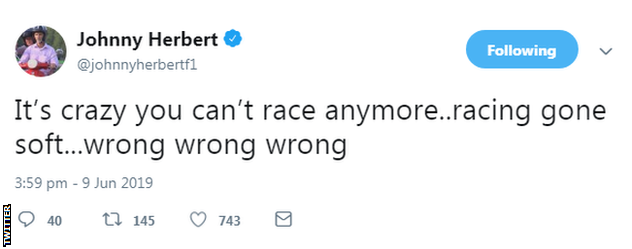
Former F1 driver and Sky pundit Johnny Herbert tweeted his reaction after the race
Inevitably, the incident and the decision caused an uproar - in the F1 paddock; among ex-drivers; among fans at the track, many of whom are Ferrari fans, some of whom booed Hamilton; on social media.
Many felt the decision was a joke. Former F1 driver Mark Webber, who had his own run-ins with Vettel when they were team-mates at Red Bull, said: "Any of the stewards ever raced at the front in F1? Mental penalty."
Former world champion Jenson Button, in his role as a pundit for Sky, said: "For me, it's a racing incident. You can't just stop the car and stay off the circuit." His fellow ex-F1 driver pundit Karun Chandhok agreed.
Alexander Wurz, the chairman of the Grand Prix Drivers' Association, said: "My observation on Vettel rejoining: his helmet moved to look into mirror only after steering correction! That he slid that far is laws of physics. No space for Lewis is name of game with street tracks. What happened to 'Let them race?' Was it sketchy? Yes! A penalty? Not in my view."
But BBC 5 live co-commentator Jolyon Palmer felt Vettel deserved the penalty, and will explain his view in his column on this website this week.
Nico Rosberg, the 2016 world champion, said the penalty was "fully deserved", external because Vettel had returned to the track unsafely and could have left more space.
And one of the stewards was Emanuele Pirro, who spent two and a half years in middling Formula 1 cars - so may or may not meet Webber's standard, the relevance of which is debatable - and had an illustrious career elsewhere, including winning the Le Mans 24 Hours five times.
It is often said that the stewards are not consistent in their decisions. But this incident was remarkably similar to one in last year's Japanese Grand Prix, when Red Bull driver Max Verstappen rejoined after a mistake at the chicane and pushed Vettel's then team-mate Kimi Raikkonen wide. Verstappen was given a five-second penalty.
Vettel said then: "Look at [the incident with] Kimi, [Verstappen]'s off the track and he comes back and if Kimi just drives on they'd collide. But it's not always right that the other guy has to move. We're all racing, the race is long."
The bigger picture
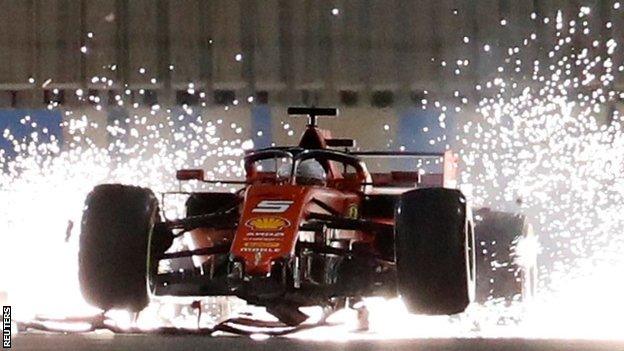
In Bahrain following Vettel's spin, his Ferrari suffered a huge vibration before the front wing shattered and forced the car up into the air
All of which is fascinating, and will drive debate for some time to come. But it rather ignores what one could argue is the bigger picture.
The bottom line was that Vettel would not have been in the situation he was had he not made yet another error under the pressure of battle.
This has become a recurring theme for him in the last two years or so, as he and Ferrari have sought in vain to find a way to combat Hamilton and Mercedes.
Last year, Vettel made five significant driving errors that slowly but surely unravelled his chances in a championship he should at the very least have taken to the final race, and arguably could have won, had those mistakes not been made.
This year, after seven races, Vettel has already made two. He spun while racing with Hamilton in Bahrain, and now this. You can agree with the penalty or not, but the question would not be there had Vettel not made the mistake that led up to it.
This year is not last year. Ferrari do not in 2019 have the car to compete with Mercedes at every race. But while Mercedes have won seven races out of seven, the facts are that three of those could potentially have gone to Ferrari - had Charles Leclerc's engine not hit problems in the closing of Bahrain, had Leclerc not crashed in qualifying in Azerbaijan, and had Vettel not gone off in Canada.
Even if Ferrari can improve the car to the point that it can challenge Mercedes in every race, Vettel cannot expect to beat a rival who operates at the level Hamilton has reached in the last three years if he cannot find a way to reduce the frequency of those mistakes.
- Published6 June 2019
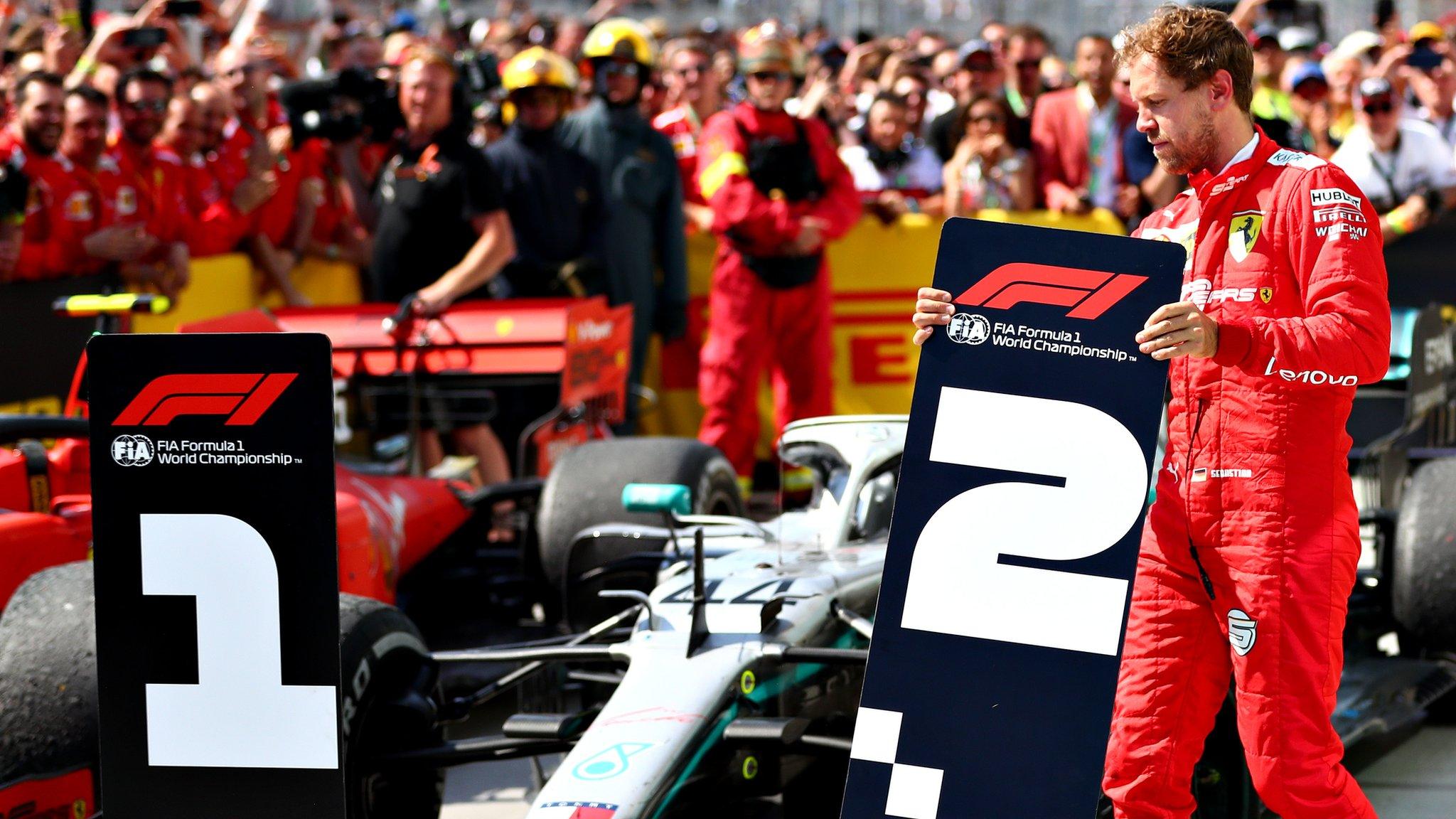
- Published7 June 2019
